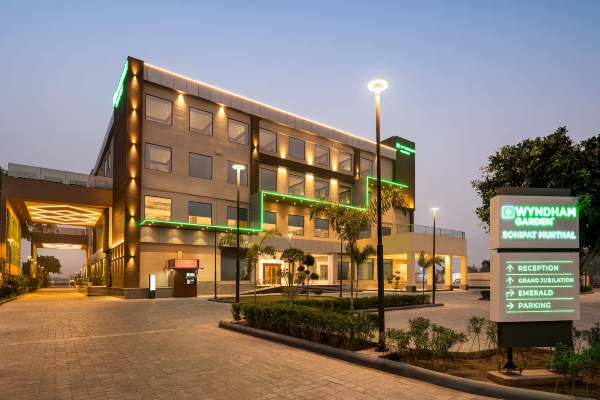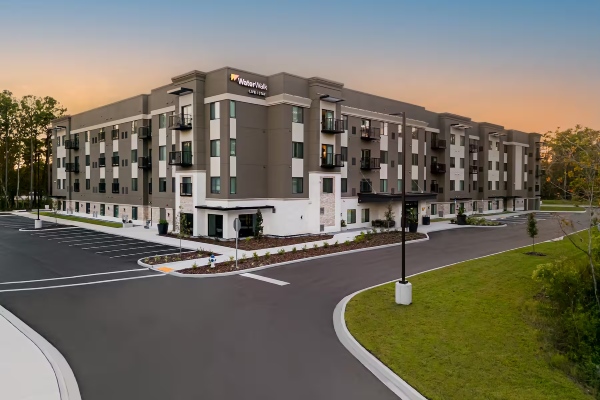Wyndham Hotels & Resorts closed 2024on a high note, reporting record-breaking growth across multiple metrics, including net-room expansion, RevPAR and franchisee engagement, including net-room growth of 4%.
Wyndham achieved a historic milestone by opening 69,000 new rooms through 2024, the largest annual organic room addition in the company’s history and a 4% increase from the previous year. The global retention rate also improved by 10 basis points to an all-time high of 95.7%.
Domestically, Wyndham saw significant expansion in mid-scale and above brands, with conversions such as the Wyndham Atlanta Buckhead Hotel and new La Quinta constructions in infrastructure-rich markets like Dallas, Austin and San Antonio.

The company’s Echo Suites brand also made its mark in new markets, including Nashville, Indianapolis, Madison (Wis.) and Richmond (Va.), exceeding owner expectations in both market share and extended stay occupancy.
Additionally, Wyndham expanded its upscale extended-stay segment with the launch of apartment-style Wyndham Residences in Washington, D.C. and downtown Houston. The extended stay market is expected to grow by nearly 30% from $21 billion in 2024 to $27 billion by 2028 and Wyndham is positioning itself strongly in this segment with Echo Suites, Hawthorn Suites, WaterWalk and Wyndham Residences, now representing nearly one-third of the company’s domestic development pipeline.
International Markets Fuel Growth
Globally, Wyndham’s net rooms surged across all major regions. The company expanded by 5% in EMEA, with notable openings like Wyndham Garden in India’s Sonipat and Ramada by Wyndham Gaziantep in Turkey. Latin America saw an 11% increase in net rooms, including Wyndham Puerto Varas in Chile and Wyndham Tulum in Mexico. The Southeast Asia and Pacific Rim region recorded a 16% growth, with significant openings in Thailand and Australia.
Meanwhile, China continued its upward trajectory, with Wyndham’s direct franchising system growing 16% year-over-year. The company signed 150 direct franchise agreements in 2024, pushing the region’s direct franchising pipeline to nearly 400 hotels, at a fee-per-available-room (feePAR) 40% higher than the current system.

RevPAR Growth
Wyndham’s U.S. RevPAR grew by 5.3% in Q4, with infrastructure-driven demand playing a pivotal role. Major infrastructure projects near Wyndham hotels contributed to a 6% RevPAR boost, and data center-driven demand fueled premium performance in markets like Silicon Valley, Dallas, Columbus (Ohio), and Jackson (Miss.).
“The surge in data center demand is defining this digital era and Wyndham is uniquely positioned to capture this opportunity. Our hotels near top U.S. data center projects saw a 500-basis-point RevPAR premium over the rest of our portfolio,” said Wyndham Hotels & Resorts President and CEO Geoff Ballotti during the earnings call.
Leisure travel demand also remained strong, increasing 3% year-over-year, with growing booking lead times and longer average stays contributing to higher ancillary revenue.
Globally, RevPAR grew 6% year-over-year in constant currency, with Latin America seeing a 32% surge, driven by pricing power and increased feePAR in Brazil, Mexico and the Caribbean. Meanwhile, EMEA recorded a 7% lift, led by strong performance in Spain, Turkey, Austria and Greece; while Southeast Asia and Canada each posted 5% growth. China, however, continued to experience deflationary pressures, with RevPAR slipping 11%.
Shift Toward Higher FeePAR
Wyndham’s focus on enhancing fee structures and attracting a higher-income customer base has paid dividends. The company’s loyalty program, Wyndham Rewards, reached 104 million members, growing by 8% year-over-year. The loyalty program now accounts for more than 50% of U.S. check-ins, aided by AI-driven technology and exclusive experiential travel offerings.
“Our guests’ average household income has risen by 9% to $104,000, with a notable increase in guests earning over $200,000. This reflects the success of our strategy to attract younger, more affluent travelers while retaining loyalty among older generations,” Ballotti said.
Wyndham has also continued its efforts to improve portfolio composition, driving higher royalty rate hotels into its system while exiting lower-fee properties. The company reported a 36% feePAR premium on domestic openings versus exiting properties and a 27% feePAR premium on international additions.
By focusing on high-value properties and premium markets, Wyndham is not only driving revenue growth but also strengthening its long-term value proposition, Ballotti said.
Looking ahead, Wyndham remains confident in its direct franchising model as a key driver of sustainable growth, with a strong development pipeline poised to fuel expansion in high-growth markets worldwide.






